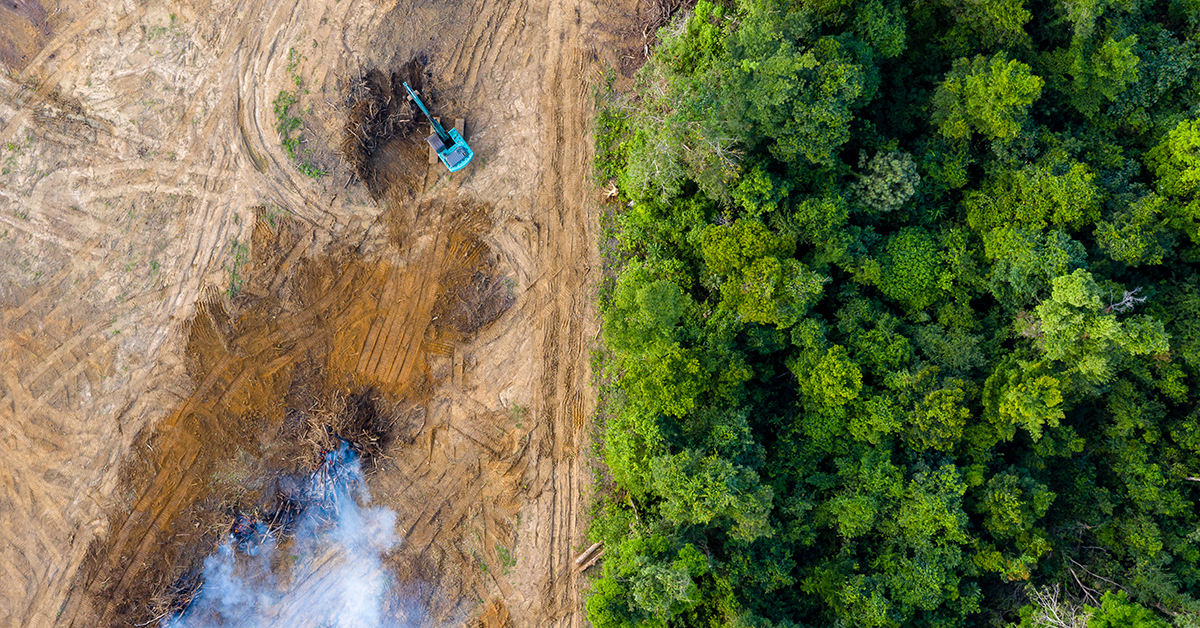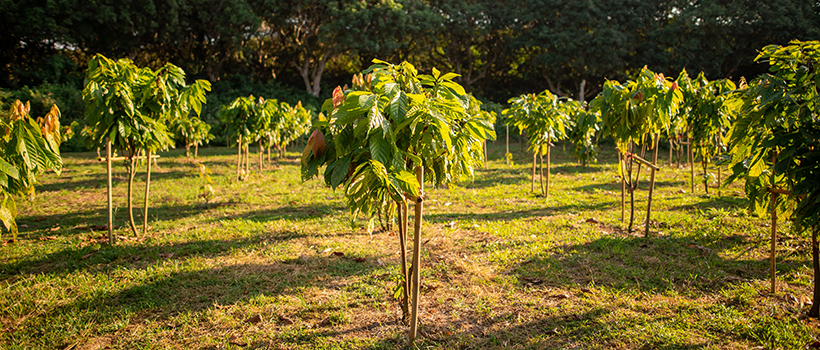
Navigating the EU Deforestation Regulation and UK Forest Risk Commodities regulations
18 April 2024 | Ed Allen, Regulatory and Scientific Affairs – Nutrition and Sustainability Lead
Sustainability is an increasingly important issue for all businesses, including those in the food and drink sector. Alongside controlling energy and water usage and limiting waste, food business operators also need to make sure that their materials are sustainably sourced.
According to ourworldindata.org, the net loss in forests globally was 4.7 million hectares per year between 2010 and 2020. Plus, according to a December 2023 statement made by the UK Secretary of State for Environment, Food and Rural Affairs, deforestation is now the second leading cause of climate change globally, after burning fossil fuels, and is responsible for around 11% of all greenhouse gas emissions.
It is this deforestation challenge that new EU and UK legislation seeks to address, and food and drink manufacturers now need to navigate these upcoming changes in the regulatory landscape.
The new legislation is set to impact due diligence and traceability requirements when sourcing certain commodities
EU Deforestation Regulation
Regulation (EU) 2023/1115 was published on 31 May 2023, and will replace EU Timber Regulation (EU) 995/2010 after 31 Dec 2027. It will apply in the EU and Northern Ireland.
From the 31 December 2024 deadline onwards, traceability should be available for goods sourced after 31 Dec 2020.
Affected goods include:
- Cocoa
- Soya
- Coffee (excluding instant coffee)*
- Palm Oil
- Timber (this does not apply to packaging needed to put the product onto the market)
- Rubber
- Cattle (excluding dairy)*
Plus there is the potential for new commodities to be added before 30 June 2025.
*Full exclusions are outlined in the legislation, and the ‘tariff codes’ for all affected goods are listed in Annex I of the legislation.
If thresholds are met for quantity of the commodity purchased then operators must be certain on the country of production for the commodity, along with other sourcing and production information. The reporting requirement thresholds are based on business size, and do not apply to SMEs (as per the Directive 2013/34/EU definition of an SME).
Operators cannot rely solely on 3rd party certifications (i.e. Rainforest alliance), and instead should use robust documentary evidence, such as the following forms of evidence:
- Due diligence statement
- As per Annex II of Regulation (EU) 2023/1115, this statement should contain the information required to ensure that traceability is possible for all supply chain actors. This will include Operator details, HS codes, country of production, geolocation data and due diligence reference.
- Risk assessment
- Using gathered data from suppliers of the commodities, operators should ensure they have carried out a supply chain risk assessment to determine whether a commodity is deforestation-free. This could include a combination of; country of origin data, geolocation data, satellite imagery, 3rd party certification, and many more sources of information. Further information can be found in Article 10 of Regulation (EU) 2023/1115. The risk assessment may mean that businesses meet the criteria for Article 13 of Regulation (EU) 2023/1115, a simplified due diligence process.
- Country of origin and geolocation data
- This data will support the due diligence statement and risk assessment, to determine whether the commodity is considered to be sourced from a low, standard, or high-risk country or region. Where products contain or have been made using cattle, geolocation data will be required for all establishments across the supply chain where cattle were kept, as per Annex II of Regulation (EU) 2023/1115.
- Polygon data
- Similar to geolocation data, this data is required for plots of land that are more than 4 hectares for relevant commodities other than cattle. This threshold can be found in Article 2, point (28) of Regulation (EU) 2023/1115.
Information requirements must be maintained and kept for 5 years from date of placing the finished product on the market. For sourcing from low risk areas, there is a simplified due diligence process, which is outline in Article 13 of the legislation.
Operators and traders (unless meeting the Directive 2013/34/EU definition of an SME) must assume responsibility for compliance with authorities and provide assistance to competent authorities to facilitate checks.
Non-conformance would result in a penalty of at least 4% of the business’s union-wide turnover in the preceding financial year, and the fine can be increased to exceed the economic benefit gained. Product can be seized and disposed of, gained revenues confiscated, and costs of enforcement recovered by authorities. Furthermore, businesses can face prohibition from exercising the simplified due diligence process, be temporarily excluded from public procurement processes (12 months), and be temporarily excluded from placing or making available on the market or exporting relevant commodities.
UK Forest Risk Commodities regulations
This new legislation was published in December 2023, as Schedule 17 of Environment Act 2021, and enforcement – as for the EU Deforestation Regulation – is set to be from 31 December 2024. It is currently unclear whether the legislation will be applicable, either in full or in part, in Northern Ireland.
Affected goods include:
- Cocoa
- Soya
- Coffee
- Palm Oil
- Cattle (*just as for the EU legislation, dairy would be out-of-scope)
- Leather
The reporting requirements for these commodities apply to businesses exceeding £50 million turnover and/or who are sourcing more than 500 tonnes of any listed commodity. Businesses who exceed threshold usage or turnover should implement a due diligence system to comply. Details surrounding what is expected for the due diligence system are limited, with further guidance and details expected from Defra in summer 2024, which should help businesses further understand their regulatory obligations.
The reporting period is defined as 1 April to 31 March in the subsequent year, and reporting must be completed no later than 6 months after the reporting period ends.
There are exemption thresholds for commodity sourcing, though these are different to those of the EU legislation. Exemption isn’t assumed, and instead must be applied for.
Non-compliance is an unlimited monetary penalty, and regulatory agencies can recover costs associated with enforcement. Further enforcement guidance is expected to be given to enforcement officers in due course.

Navigating these challenges across both EU and UK
A summary of the key points for both the EU and UK legislation is as follows:
- Enforcement date is 31 Dec 2024;
- There are small differences between EU and UK legislations (e.g. commodities and thresholds);
- Commodities covered are; cocoa, soya, coffee, palm oil, cattle, rubber (EU only), leather (UK only), timber (EU only);
- There are different threshold metrics used to determine reporting requirements;
- All regulated businesses must have a due diligence system for compliance.
These step changes in requirements pose a significant challenge for affected businesses who do not already have this elevated level of traceability and due diligence in place.
Where a business has a heavy reliance on a particular commodity as their main raw material, it may be likely that the foundations of this work may already be in place, with small adjustments or processes being required to meet the due diligence and risk assessment requirements. However, for businesses who are navigating this for the first time – particularly where many of their supply chains are affected across multiple commodities – there is a great deal of work to do before the deadlines. So, clarity and guidance is needed.
Sources of guidance include:
- UK Forest Risk Commodities guidance is expected to be issued by Defra in Summer 2024
- EU Deforestation Regulation frequently asked questions document
- EU Deforestation Regulation implementation platform
How we can help
Our experienced team of regulatory experts can help you ensure that your products are compliant with the legislative requirements of your target market, through understanding your business operations and identifying key commodities or products within your portfolio.
Our team are also able to support your business by understanding the available data and sourcing initiatives, and identifying key gaps or risk areas when considering these new regulatory requirements.
Across market entry support, label review, product review and training, we offer a valuable, extensive and authoritative information and advisory service to help clients stay compliant with food regulations in more than 80 countries.
How can we help you?
For support with greenwashing and environmental claims legislation for your market, contact our Regulatory Affairs Team.
Are you a Campden BRI member who attends the MIG meetings?
- If not, you’re missing out on a whole host of exclusive benefits such as learning from industry-leading experts and networking with peers to overcome your challenges.







